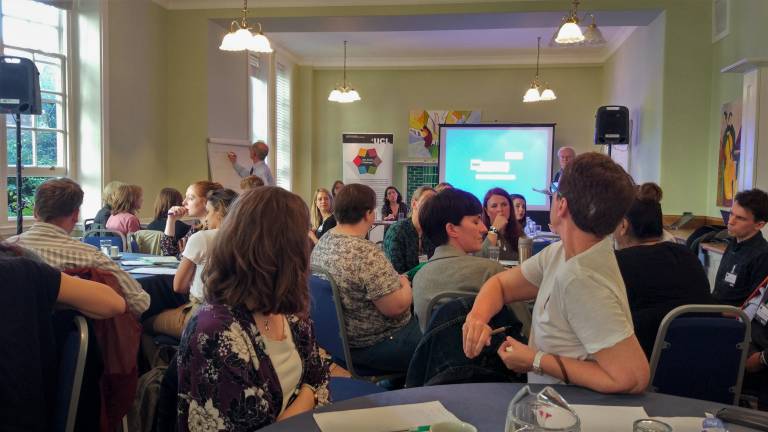Adolescent Lives – a special Grand Challenges initiative
24 October 2018
“We are at a moment of change regarding research into adolescence.”
Academics from across UCL recently came together alongside policymakers, funding bodies, and representatives from the charity sector to discuss ways in which research into adolescence can be advanced. The one-day showcase and workshop presented an opportunity to highlight the emerging, innovative, cross-disciplinary research activities and plans fostered by UCL’s Grand Challenges’ Adolescent Lives initiative. The event provided a forum for discussion around ways in which findings from the initiative's projects (enabled by small grants, mostly for less than £3,000) can lead to big ideas and provide a strong basis for the development of major research proposals.
Initiated and led by Professor Doug Bourn (Professor of Development Education, UCL Institute of Education), Professor Anthony Costello (Professor of Global Health and Sustainable Development, UCL and Former Director, Department of Maternal, New-born, Child and Adolescent Health at the World Health Organisation), and Professor Miranda Wolpert (Professor in Evidence-Based Practice and Research, UCL and Director of the Innovation, Evaluation and Dissemination Programme at the Anna Freud National Centre for Children and Families), the workshop combined experts on the theme of adolescence from a range of disciplines.
Discussion on how best to advance research into adolescence was consequently wide-ranging, as evidenced in keynote presentations from Professor Sarah-Jayne Blakemore FBA (Professor of Cognitive Neuroscience and Deputy Director of the UCL Institute of Cognitive Neuroscience) and Dr Avril Keating (Senior Lecturer in Comparative Social Sciences, UCL Institute of Education). The multitude of perspectives considered on the day was further reinforced by Professor Anthony Costello’s contribution when he noted that one-third of people living in developing countries are adolescents, yet interventions focused on adolescent health and wellbeing were rare in the global south. He, therefore, posed the question of how to engage young people in academic research in this area and how to ensure that research involving adolescents informs policy?
Particular focus was also attributed to the discussion in the areas of:
- how best to define adolescence;
- adolescent mental health; and
- the role of peer influence during adolescence.
Undoubtedly, a key message that ran throughout the day was the immediacy of the issues discussed and the timely nature of focusing research on the area of adolescence. Professor Miranda Wolpert encapsulated this during the discussion addressing the policy implications of research undertaken at UCL, commenting: ‘We are at a moment of change, and positive change, regarding research into adolescence. Even two years ago we would not have been having these conversations.’
As we look to build upon the connections made, dialogues established, and research initiated under the Adolescent Lives programme at this pivotal moment of change, the Grand Challenges team are seeking to build a network of UCL academics conducting research in this area. As Dr Avril Keating noted: ‘There is so much interest and energy around this theme, both in UCL and beyond, and it is wonderful to have institutional support for these cross-disciplinary discussions.’
The workshop and Grand Challenges’ Adolescent Lives initiative is thus intended to be a starting point in establishing UCL as an institution leading the way on researching adolescence.

 Close
Close

